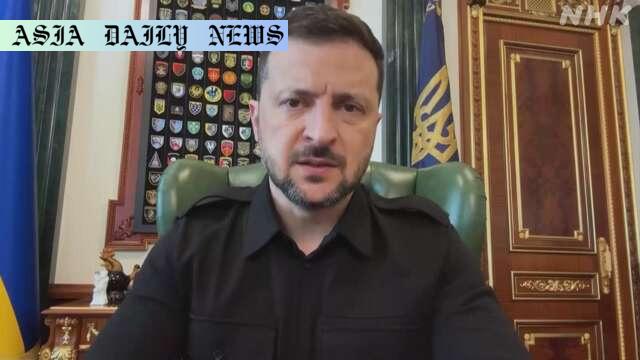Drone attack: Ukrainian President Zelenskyy confirms Russia launched the largest drone attack, with over 700 UAVs targeting Ukrainian territories.
Russia launched its largest drone attack using over 728 UAVs.
Ukraine successfully shot down more than 90% of these drones.
Zelenskyy calls for stricter sanctions against Russia.
US promises new support with a shipment of defensive weapons.

Russia’s Largest Drone Attack on Ukraine
This week, Ukrainian President Volodymyr Zelenskyy announced that Russia conducted its largest drone assault on Ukrainian territories. The scale of the attack was staggering, involving an estimated 728 unmanned aerial vehicles (UAVs) and 13 missiles, as per the Ukrainian Air Force’s statistics. Reportedly, the missiles included Moscow’s hypersonic Kinzhal type, known for their advanced and destructive capabilities.
What further amplified the severity of the attack is the symbolism behind the timing. Zelenskyy remarked that this attack was emblematic not only of Russia’s military aggression but also of its dismissal of efforts toward peace and ceasefire discussions. The large-scale air assault, described as a ‘symbolic attack,’ underscores Moscow’s escalating commitment to offensive strategies amidst diplomatic failures. Such actions further aggravate the already volatile geopolitical climate in Eastern Europe and beyond.
Defense Preparedness Amid Crisis
Despite the intensity of the attack, Ukraine demonstrated robust air defense capabilities by intercepting over 90% of the drones and missiles. This achievement reflects effective countermeasures that have been improving amidst ongoing military support from the West. While the Ukrainian air defenses have successfully mitigated the potential extent of damage, the scale of the operation signals an evolution in the types of threats they face.
The United States has also responded promptly to the situation. In a strategic move, the Trump administration announced its decision to lift restrictions over specific arms shipments to Ukraine. Additionally, informed sources confirmed the US commitment to immediate aid, including ten Patriot air-defense interceptors. However, the scale of this assistance, while significant, is still smaller compared to prior shipments that had been paused. Such actions highlight the critical need for higher international collaboration to strengthen Ukraine’s defense mechanisms amidst the ongoing conflict.
Implications of Russia’s Actions
The intensified drone attacks pose a severe challenge not just to Ukrainian sovereignty but also to global diplomacy. Russia’s continued military aggression is a repudiation of ceasefire propositions and peace efforts. These actions not only exacerbate an already disastrous humanitarian crisis but also strain geopolitical relations worldwide. President Zelenskyy has called for stricter sanctions on Russia, urging the international community to take decisive steps to deter Moscow from further aggression.
The attack reflects a shift in modern warfare, as the deployment of unmanned vehicles increases exponentially. Not only do these attacks symbolize Russia’s evolving military strategies, but they also illustrate the broader implications of technological advancements in the context of war. The global community, therefore, must address the emerging security challenges these technologies pose and their broader consequences on socio-political stability.
The Path Forward
While the conflict rages, the international community is facing multifaceted dilemmas of politics, security, and humanitarian assistance. The latest assault reinforces the urgent need to prioritize robust support for Ukraine’s defense infrastructure. At the same time, diplomatic channels must remain engaged to achieve long-term peace in the region. The combination of swift defensive actions and comprehensive sanctions against Russia is critical in achieving both immediate and sustained resolutions.
The ongoing crisis is a stark reminder of the cost of unresolved conflicts and the immense human suffering caused by military aggression. Collective action and strategic planning remain the need of the hour to mitigate this crisis while upholding international law and sovereignty.
Commentary
The Escalation of Russia’s Aggression
Russia’s latest drone assault on Ukraine is a defining moment in the ongoing conflict. With 728 UAVs deployed, this attack marks a new peak in Moscow’s military strategy, leaving the international community reeling in its wake. In any conflict, the nature and scale of attacks often reflect the aggressor’s determination to overpower its adversary. In this case, the escalation signals a grim reminder of the lengths to which Russia is prepared to go, not just as a show of military strength but also as an outright dismissal of ceasefire dialogues.
Ukraine’s Resilience Amid Adversity
Despite the unprecedented scale of the attack, Ukraine’s resolute defenses have been nothing short of remarkable. Intercepting over 90% of unmanned drones is an achievement that not only demonstrates the effectiveness of Ukraine’s air defense system but also reinforces the importance of continued international support. The significant damage potentially prevented speaks to Ukraine’s preparedness and highlights the importance of further investments in such technologies.
Global Responsibility in Times of Crisis
The implications of this attack stretch far beyond the Ukrainian borders. As President Zelenskyy rightly stated, this assault is symbolic of Russia’s refusal to engage in meaningful peace negotiations. The global community’s response plays a pivotal role in shaping the direction this crisis will take. Stricter sanctions, enhanced cooperation, and unwavering support for Ukraine are critical during such dire times. The success or failure of these global efforts will set a precedent for how the world manages similar aggressions in the future.
It’s high time that the international community unites in response to such escalations. Failing to address these actions with the urgency they deserve jeopardizes not just a nation but the principles of sovereignty and law that uphold global peace.


